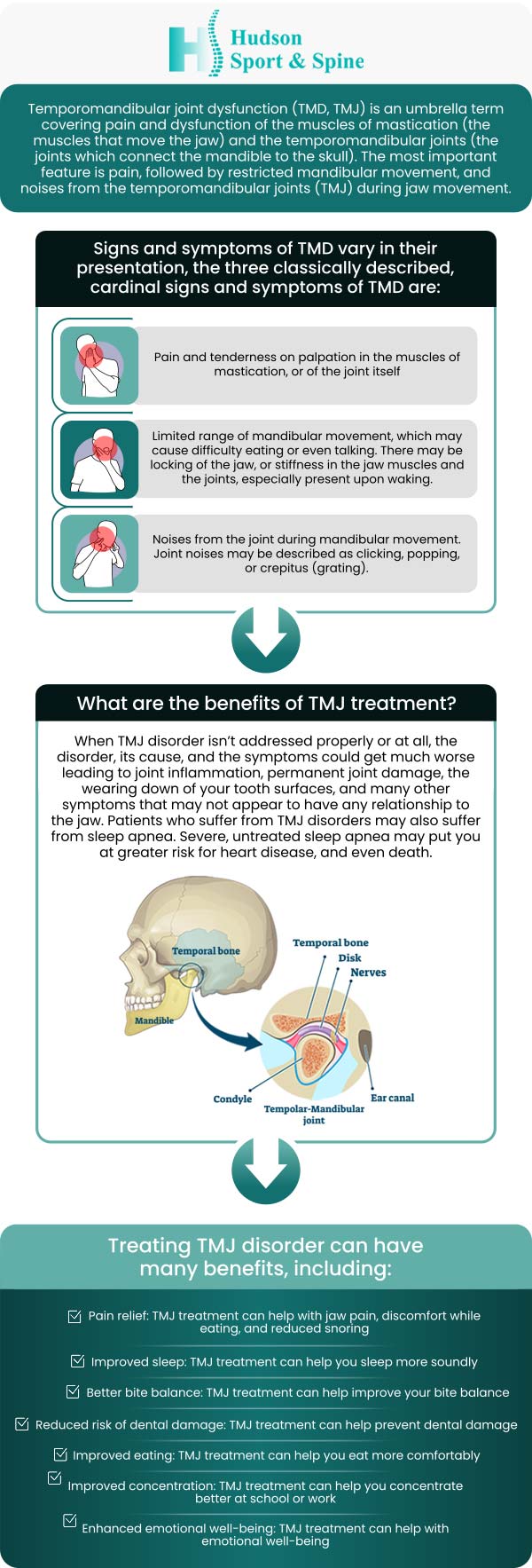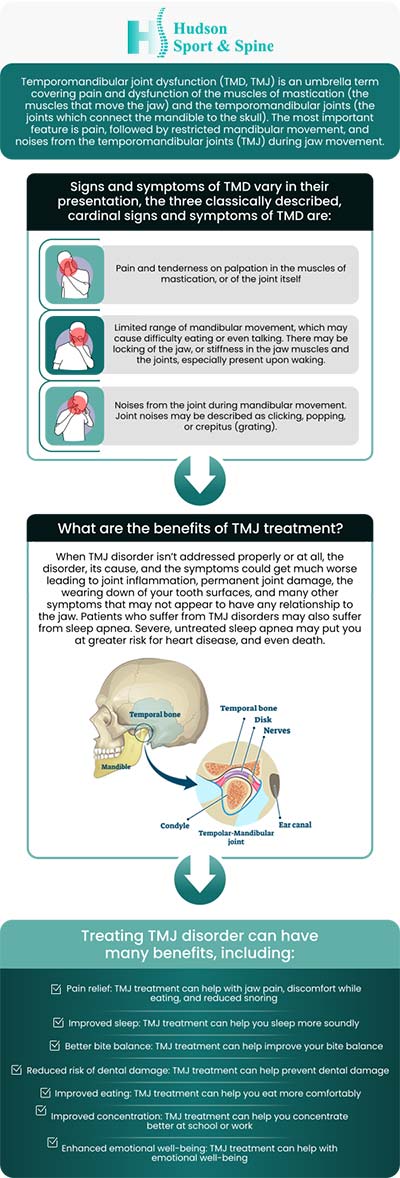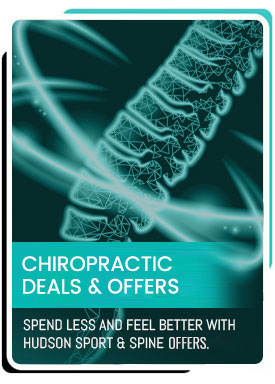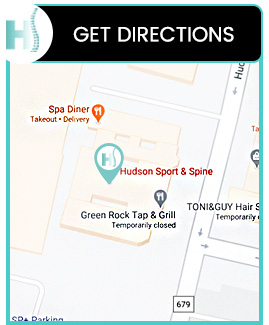TMJ Disorders: Symptoms, Causes & Treatment
TMJ disorder treatment typically includes a combination of physical therapy and pain management techniques to alleviate jaw discomfort and improve function. Lifestyle modifications, such as stress reduction and avoiding hard foods, can also help manage symptoms. In severe cases, surgical interventions may address structural issues within the temporomandibular joint. Come to Hudson Sport & Spine and consult Dr. Todd Givens, DC, for treatment options. For more information, contact us today or schedule an online appointment. We are conveniently located at 70 Hudson St Suite 2B, Hoboken, NJ 07030.




Table of Contents:
What is TMJ?
What causes TMJ disorders?
What are the symptoms of TMJ disorders?
How is TMJ diagnosed?
The temporomandibular joint, known as the TMJ for short, acts like a sliding hinge, connecting your jawbone to your skull. This important joint allows you to chew, speak, and move your jaw. When dysfunction of the TMJ occurs, it can cause chronic discomfort and significantly affect your quality of life.
TMJ disorders are characterized by pain in the jaw, face, neck, or shoulders. Those affected by TMJ dysfunction may also have trouble chewing, a clicking or popping sound when opening their mouth, and persistent headaches. If you suspect you have problems with your TMJ, it’s important to consult a healthcare professional for a thorough assessment and comprehensive treatment.
TMJ disorders can stem from a variety of factors. One of the most common causes of TMJ dysfunction is injury to the jaw or head. Arthritis, particularly osteoarthritis or rheumatoid arthritis, can also wear down the joint, leading to TMJ problems.
Another significant factor in TMJ dysfunction is bruxism, which is the habit of clenching or grinding your teeth. This often occurs during sleep and can put immense pressure on the TMJ, leading to pain and other concerns. Stress and anxiety can worsen this habit, so stress management is an important aspect of preventing TMJ problems.
Furthermore, structural issues like a misaligned jaw or bite can also contribute to TMJ disorders. These abnormalities can cause the joint to function improperly, leading to inflammation and discomfort. In addition, genetics can play a role; if you have a family history of TMJ disorders, you are more susceptible to developing such issues.
To provide effective treatment, your healthcare provider will examine your TMJ and discuss the nature of your symptoms to determine what’s the root cause of your discomfort.
TMJ problems can cause a variety of symptoms, ranging from mild discomfort to severe pain. Some of the most common signs of TMJ dysfunction include:
● Jaw pain or tenderness – Pain is typically localized around the temporomandibular joint but may radiate to the face, neck, and shoulders. Some patients also report experiencing pain around the ears.
● Difficulty chewing – TMJ issues can lead to discomfort while eating, changes in how your upper and lower teeth fit together, or a clicking, popping, or grating sound when you open or close your mouth. This can be alarming, but it is a common sign of TMJ disorders.
● Headaches – Often resembling tension headaches, discomfort caused by TMJ issues can be severe and mistaken for migraines.
● Jaw locking – The jaw may get stuck in an open or closed position, which can be particularly distressing.
● Ear-related symptoms – Earaches, ringing in the ears (tinnitus), or a sensation of fullness in the ear can occur because of TMJ-related concerns.
In addition, some patients with TMJ problems report toothaches and stiffness around their jaw. If you have noticed any of these symptoms or if they are affecting your daily life or wellness, you should see a specialist near you to have your concerns evaluated.
When you visit a specialist with TMJ concerns, they will go through a multi-step process to pinpoint the root cause of your discomfort. Your doctor will start by asking detailed questions about your TMJ concerns. They’ll want to know when the pain started, how severe it is, and whether anything triggers or worsens it. They’ll also ask about your general health history and any past jaw injuries.
During the exam, your doctor will listen to and feel your jaw as you open and close your mouth. They’ll check the range of motion in the TMJ and press on areas around your jaw to identify areas of tenderness.
In addition, your doctor may order imaging tests to get a closer look at your TMJ, such as an X-ray, an MRI scan, or a CT scan. As an accurate diagnosis is key to effective treatment, the specialist will be very thorough.
If you’re experiencing symptoms of a TMJ disorder, it’s strongly urged that you seek professional guidance promptly. For those near Hoboken, New Jersey, the dedicated team at Hudson Sport & Spine can help you address TMJ-related issues through comprehensive pain management.
At Hudson Sport & Spine, Dr. Todd Givens, DC, provides specialized care for TMJ disorders by addressing the muscular and joint imbalances that contribute to jaw pain, stiffness, and clicking. TMJ (temporomandibular joint) disorders can cause discomfort in the jaw, headaches, earaches, and difficulty chewing. Dr. Givens begins with a thorough evaluation to identify the root cause—whether it’s related to posture, stress, clenching, or joint dysfunction. Treatment at Hudson Sport & Spine may include gentle chiropractic adjustments, soft tissue therapy, posture correction, and stress-reducing techniques to relax the jaw and restore normal joint motion.
Dr. Givens creates a personalized care plan to reduce inflammation, improve alignment, and prevent recurring flare-ups. At Hudson Sport & Spine, the focus is on natural, drug-free relief that improves jaw function and overall well-being. If you’re experiencing TMJ symptoms, Dr. Givens offers proven, hands-on solutions to help you feel better fast. Contact us for more information. We serve patients from Hoboken NJ, Jersey City NJ, Weehawken NJ, West New York NJ, Guttenberg NJ, Secaucus NJ, Harrison NJ, Kearny NJ, Newark NJ, Belleville NJ, North Bergen NJ and Lyndhurst NJ.
Check Out Our 5 Star Reviews









